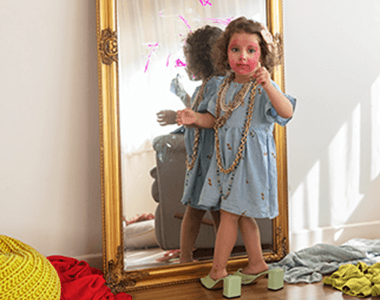5 Ways to Create a Strong Emotional Bond With Your Child

You’re in the mall with your usually well-behaved toddler. You tell her she cannot have one MORE ice-cream and she goes into an immediate and unexpected meltdown. One moment she’s all smiles and the next, your angelic toddler is face down on the floor, banging her fists, shrieking her little lungs out and gathering a steadily growing audience. Every eye seems to be looking at you accusingly. You feel like the worst mom on the planet. Sounds familiar?
As parents, we all go through situations where our child’s emotional state is totally unpredictable. The smallest stimulus can trigger a massive and disproportionate reaction. It could be a host of factors – tiredness, overstimulation, hunger, hypersensitivity. Or just the fact that they don’t know how to navigate the complex and scary world of emotions.
Our responses to their outbursts will not only determine whether or not they learn to regulate their emotions in a constructive way, but will also influence the relationship we share with them. In fact, one of the most powerful parenting tools that we have is the natural emotional bond that exists between our child and us.
So how do we create a strong emotional foundation for our children? How do we raise a happy, healthy, well-behaved child? How do we build this vital resource necessary for successful parenting?
1. Mirror, mirror…
Our children learn most lessons about emotions from watching us. This includes the ability to control impulses, delay gratification, self-motivate, read other people’s social cues and cope with life’s ups and downs. Psychologists say that children with high Emotional Intelligence (EI), that is the ability to handle feelings and emotions in a constructive way, outperform their peers personally and professionally throughout their lives.
2. Focus on strengths not weaknesses
This applies not just to our child, but to us as well. As parents, we feel constantly judged and therefore, inadequate. We take our child’s behavior personally. We feel guilty too easily and remain stuck in guilt for too long.
Parenting is not an easy task, and we need to acknowledge ourselves for every small victory. By talking and acknowledging things we do right, we encourage our children to build their own reserves of confidence and achievements. By avoiding criticism and correction, and instead focusing on the positive, we help them see themselves as good people capable of good things.
3. Be fully present
It sounds deceptively simple. But really, being present just means paying attention. Our children thrive with nothing more that our undivided attention. So let’s silence the smartphone and leave multi-tasking to the corporate executives. The secret to a great relationship is some focused time every day doing NOTHING other than being with our child.
4. Listen. Just listen.
Let’s face it, there are times when we’d like nothing better than for our child to be silent for just 5 minutes while we plan our day or make our to-do lists. But chances are, if we put that list down and just listen to what our child is saying, she will feel acknowledged and will move on to the next activity, leaving us free to contemplate our day. More importantly though, we create a culture of ‘listening’ which allows our child to approach us with whatever they’re going through especially through the awkward adolescent years.
5. Make mistakes. Make good. Reconnect.
We lose our cool. We yell. We make threats. We swear. Yes, actually use words that we forbid our child from using.
When we find ourselves on the far end of the ‘Perfect Parent’ spectrum, we needn’t beat ourselves up. We merely need to borrow from the own rulebook we give our children. Which is ‘Say sorry’, acknowledge our mistake honestly and hug it out. By doing this we demonstrate our love not just through words, but also through actions.













 Expert Opinion
Expert Opinion


 Parenting Articles
Parenting Articles